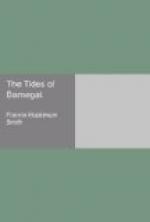Other records are strewn along the beach; these the tide alone cannot efface—the bow of some hapless schooner it may be, wrenched from its hull, and sent whirling shoreward; the shattered mast and crosstrees of a stranded ship beaten to death in the breakers; or some battered capstan carried in the white teeth of the surf-dogs and dropped beyond the froth-line. To these with the help of the south wind, the tides extend their mercy, burying them deep with successive blankets of sand, hiding their bruised bodies, covering their nakedness and the marks of their sufferings. All through the restful summer and late autumn these battered derelicts lie buried, while above their graves the children play and watch the ships go by, or stretch themselves at length, their eyes on the circling gulls.
With the coming of the autumn all this is changed. The cruel north wind now wakes, and with a loud roar joins hands with the savage easter; the startled surf falls upon the beach like a scourge. Under their double lash the outer bar cowers and sinks; the frightened sand flees hither and thither. Soon the frenzied breakers throw themselves headlong, tearing with teeth and claws, burrowing deep into the hidden graves. Now the forgotten wrecks, like long-buried sins, rise and stand naked, showing every scar and stain. This is the work of the sea-puss—the revolving maniac born of close-wed wind and tide; a beast so terrible that in a single night, with its auger-like snout, it bites huge inlets out of farm lands—mouthfuls deep enough for ships to sail where but yesterday the corn grew.
In the hull of this newly stranded sloop, then— sitting high and dry, out of the reach of the summer surf,—Tod and Archie spent every hour of the day they could call their own; sallying forth on various piratical excursions, coming back laden with driftwood for a bonfire, or hugging some bottle, which was always opened with trembling, eager fingers in the inmost recesses of the Home, in the hope that some tidings of a lost ship might be found inside; or with their pockets crammed with clam-shells and other sea spoils with which to decorate the inside timbers of what was left of the former captain’s cabin.
Jane had protested at first, but the doctor had looked the hull over, and found that there was nothing wide enough, nor deep enough, nor sharp enough to do them harm, and so she was content. Then again, the boys were both strong for their age, and looked it, Tod easily passing for a lad of twelve or fourteen, and Archie for a boy of ten. The one danger discovered by the doctor lay in its height, the only way of boarding the stranded craft being by means of a hand-over-hand climb up the rusty chains of the bowsprit, a difficult and trousers-tearing operation. This was obviated by Tod’s father, who made a ladder for the boys out of a pair of old oars, which the two pirates pulled up after them whenever an enemy hove in sight. When friends approached it was let down with more than elaborate ceremony, the guests being escorted by Archie and welcomed on board by Tod.




